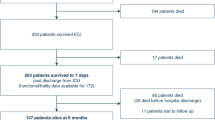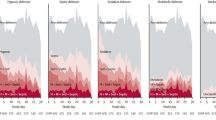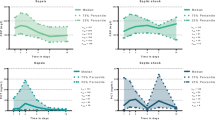Abstract
Persistent inflammation in intensive care unit (ICU) survivors is associated with higher long-term mortality and poorer mobility. However, it is unknown if inflammatory markers are associated with other dysfunctions observed in survivors of critical illness. Thus, it was investigated if plasma levels of interleukin (IL)-6 and IL-10 at hospital discharge were associated with long-term functional and cognitive performance after ICU discharge. Adult patients admitted for > 48 h to a 20-bed mixed ICU in a University Hospital had blood collected within 48 h before hospital discharge to measure IL-6 and IL-10 levels. After a median time of 48 months, cognitive status was determined by the Mini-Mental State Examination (MMSE), and functional status was determined by the Barthel Index. Patients at the higher 25th percentile of both IL-6 and IL-10 had a worse long-term cognitive performance, but not worse functional status, even when adjusted for confounders after long-term follow-up. In conclusion, elevated circulating IL-6 and IL-10 concentrations at hospital discharge were associated with long-term cognitive dysfunction in ICU survivors.

Similar content being viewed by others
Abbreviations
- IL:
-
interleukin
- ICU:
-
intensive care unit
- CAP:
-
community-acquired pneumonia
- RASS:
-
Richmond Agitation and Sedation Scale
- MMSE:
-
Mini-Mental State Examination
- BADL:
-
basic activities of daily life
- ACE-27:
-
Adult Comorbidity Evaluation-27
- APACHE:
-
acute physiologic assessment and chronic health evaluation
- AD:
-
Alzheimer’s disease
References
Adhikari NK, Fowler RA, Bhagwanjee S et al (2010) Critical care and the global burden of critical illness in adults. Lancet 376:1339–1346
Herridge MS (2009) Legacy of intensive care unit-acquired weakness. Crit Care Med 37:S457–S461
Griffith DM, Lewis S, Rossi AG, Rennie J, Salisbury L, Merriweather JL, Templeton K, Walsh TS et al (2016) Systemic inflammation after critical illness: Relationship with physical recovery and exploration of potential mechanisms. Thorax 71:820–829
Yende S, D’Angelo G, Kellum JA et al (2008) Inflammatory markers at hospital discharge predict subsequent mortality after pneumonia and sepsis. Am J Respir Crit Care Med 177:1242–1247
Hill NE, Saeed S, Phadke R, Ellis MJ, Chambers D, Wilson DR, Castells J, Morel J et al (2015) Detailed characterization of a long-term rodent model of critical illness and recovery. Crit Care Med 43:e84–e96
Mina F, Comim CM, Dominguini D (2014) Il1-β involvement in cognitive impairment after sepsis. Mol Neurobiol 49:1069–1076
Schwalm MT, Pasquali M, Miguel SP, dos Santos JPA, Vuolo F, Comim CM, Petronilho F, Quevedo J et al (2014) Acute brain inflammation and oxidative damage are related to long-term cognitive deficits and markers of neurodegeneration in sepsis-survivor rats. Mol Neurobiol 49:380–385
Moraes CA, Santos G, de Sampaio E, Spohr TC et al (2015) Activated microglia-induced deficits in excitatory synapses through IL-1β: implications for cognitive impairment in sepsis. Mol Neurobiol 52:653–663
Folstein MF, Folstein SE, McHugh PR (1975) Mini-mental state. A practical method for grading the cognitive state of patients for the clinician. J Psychiatr Res 12:189–198
Mahoney FI, Barthel DW (1965) Functional evaluation: the Barthel index. Md State Med J 14:61–65
Annane D, Sharshar T (2015) Cognitive decline after sepsis. Lancet Respir Med 3:61–69
Marshall GA, Rentz DM, Frey ME, Locascio JJ, Johnson KA, Sperling RA, Alzheimer's Disease Neuroimaging Initiative (2011) Executive function and instrimental activities of daily living in mild cognitive impairment and Alzheimer’s disease. Alzheimers Dement 7:300–308
Hennessy E, Gormley S, Lopez-Rodriguez AB, Murray C, Murray C, Cunningham C (2017) Systemic TNF-α produces acute cognitive dysfunction and exaggerated sickness behavior when superimposed upon progressive neurodegeneration. Brain Behav Immun 59:233–244
He HJ, Wang Y, Le Y et al (2012) Surgery upregulates high mobility group box-1 and disrupts the blood-brain barrier causing cognitive dysfunction in aged rats. CNS Neurosci Ther 18:994–1002
van den Boogaard M, Kox M, Quinn KL, van Achterberg T, van der Hoeven JG, Schoonhoven L, Pickkers P (2011) Biomarkers associated with delirium in critically ill patients and their relation with long-term subjective cognitive dysfunction; indications for different pathways governing delirium in inflamed and noninflamed patients. Crit Care 15:R297
Davis DH, Muniz-Terrera G, Keage HA et al (2017) Association of delirium with cognitive decline in late life: a neuropathologic study of 3 population-based cohort studies. Epidemiological clinicopathological studies in Europe (EClipSE) collaborative members. JAMA Psychiatry 74:244–251
Brosseron F, Krauthausen M, Kummer M, Heneka MT (2014) Body fluid cytokine levels in mild cognitive impairment and Alzheimer’s disease: a comparative overview. Mol Neurobiol 50:534–544
Funding
Supported by grants from the National Council for Scientific and Technological Development (CNPq), NENASC project (PRONEX program CNPq/FAPESC), PPSUS-FAPESC, and Universidade do Extremo Sul Catarinense.
Author information
Authors and Affiliations
Contributions
MM and SRB were involved in the conception and design, data acquisition, analysis and interpretation of the data, and drafting the manuscript. EBL, HD, RLD, and FV were involved in the conception and design and data acquisition. CDT, CR, and FD-P were involved in the conception and design, analysis and interpretation of the data, and drafting the manuscript.
Corresponding author
Ethics declarations
The institutional review board at Hospital São José (number 61541616.7.0000.5364) approved the study, and a written informed consent was obtained from all participants or their proxies.
Conflict of Interest
The authors declare that they have no competing interests.
Rights and permissions
About this article
Cite this article
Maciel, M., Benedet, S.R., Lunardelli, E.B. et al. Predicting Long-term Cognitive Dysfunction in Survivors of Critical Illness with Plasma Inflammatory Markers: a Retrospective Cohort Study. Mol Neurobiol 56, 763–767 (2019). https://doi.org/10.1007/s12035-018-1166-x
Received:
Accepted:
Published:
Issue Date:
DOI: https://doi.org/10.1007/s12035-018-1166-x




